This editorial overview provides an introduction to this special Journal of Sustainability (JSE) issue devoted to water and climate change, which is being released during United Nations World Water Day 2020. The article contextualizes some of the water security risks that are exacerbated by climate change, such as increasing floods and droughts. This piece further provides a brief overview of the articles in the special water and climate issue of the JSE.
Continue Reading“The Community Food Forest Handbook: How to Plan, Organize, and Nurture Edible Gathering Places” by Catherine Bukowski and John Munsell is a rare edition to the literatures of permaculture and agroecology: it foregrounds sociocultural dimensions in the context of ecological design.
Continue Reading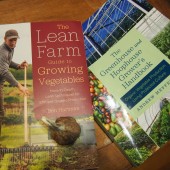
Two books dealing with sustainable agriculture are reviewed as resources for teaching: The Greenhouse and Hoophouse Grower’s Handbook and The Lean Farm Guide to Growing Vegetables. Both fill important gaps in the field.
Continue ReadingSustainability education examines the confluence between society, environment, and economy. Yet, an overemphasis on economy has historically trumped attention to the other sphere’s needs. Such an imbalance, editors David Selby and Fumiyo Kagawa argue, calls for a radical reconceptualization of sustainability education. In their book, Sustainability Education Frontiers: Critical Transformative Voices from the Borderlands of Sustainability Education, they invite authors from ten different countries to discuss how sustainability education can be transformed to meet the needs of a diverse and interconnected world.
Continue Reading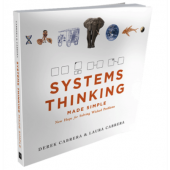
In this book review the author summarized the text, Systems thinking made simple: New hope for solving wicked problems by Derek and Laura Cabrera (2015). In the text, cognitive thought is described as a complex adaptive system and four simple rules of thinking are included as an approach to problem solving.
Continue Reading
Book review for The Invention of Nature: Alexander von Humboldt’s New World by Andrea Wulf
Continue Reading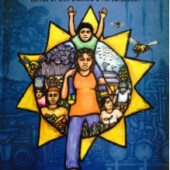
Abstract: The anthropocene era is one that is rife with ecological and social crises. Although many have been aware of the enormity of these problems and their systemic roots, the widespread educational response has not been sufficient in preparing youth to take part in creating a more just and sustainable world. Climate change is an umbrella issue for much of what the worlds facing. It is time for teachers to take the lead in using the classroom as a place to bring relevant, critical, joyful education that will lead to action in this crucial time. The following article is a book review for A People’s Curriculum for the Earth, a powerful resource for helping teachers equip students to confront our interconnected global crises, especially the climate crisis, and to highlight stories of teachers, activists, and organizations working to make a difference.
Continue Reading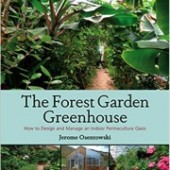
Abstract: Book review of The Forest Garden Greenhouse by Jerome Osentowski.
Continue Reading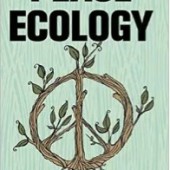
Abstract: Renowned author and professor Randall Amster embraces peace ecology as a way to engage in cooperative actions and practices that build community and foster resilience. Peace Ecology bridges the gap between social and environmental sciences, highlighting important ethical and interdisciplinary aspects of the field of peace studies and showing how these relate to both human communities and the places in which they are embedded.
Amster, R. (2015). Peace ecology. New York: Routledge.
Continue ReadingAbstract: Reviews the book Crimes against Nature: Squatters, Poachers, Thieves, and the Hidden History of American Conservation by Karl Jacoby. Discusses how this work reveals the often hidden consequences of the early conservation movement for land-based people.
Continue Reading
Abstract: This essay examines Randall Amster’s book Peace Ecology as a critical intervention articulating vital connections among discourses from peace and justice studies (on one hand) and the most vexing problems addressed by sustainability studies (on the other): from violent conflict and social inequity to environmental injustice and global ecocide. Reading this dialogue through the lens of hope, the author argues that Amster’s synthesis of this research provides effective tools for helping educators, students and practitioners of sustainability to generate new thought – and direct action – around these issues. By cataloguing and analyzing the many successes of ecological peacebuilding without absolving the paradigms of thought that continue to propagate war against people and planet, Amster empowers us to avoid both the trap of despair and the delusion of complacent optimism in order to foster the conditions that promote human beings’ mutually-beneficial peace and coexistence with each other and with the Earth.
Continue Reading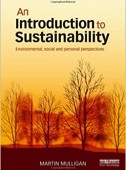
Abstract: Martin Mulligan’s An Introduction to Sustainability: Environmental, social and personal perspectives reviews the history of sustainability science, placing emphasis on the social-ecological model. This model introduces the importance of personal values and choices. He discusses topics around four themes: limits to growth, diversity, community and resilience. It is well-written, informative and novel.
Mulligan, M. (2014). An Introduction to Sustainability: Environmental, Social and Personal Perspectives. New York: Routledge. ISBN-13: 978-0415706445
Continue Reading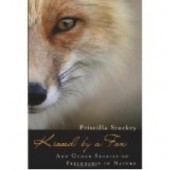
Abstract: In Kissed by a Fox: And Other Stories of Friendship in Nature, Priscilla Stuckey, Ph.D. presents a collection of stories as an integrated whole. The purpose of this book review is to offer this work of creative non-fiction as an illuminating example of how love and relationships are essential ingredients for sustainability. Kissed by a Fox is fundamentally about relationships between humans and other-than-human beings. Love for the natural world and one’s self are consistently described throughout the book as necessary for taking in and giving out what will sustain us and the earth. Stuckey delivers this message through narrating her experiences with “friendships in nature” and how these relationships transformed her life.
Continue Reading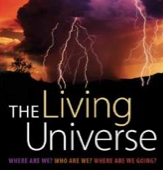
In The Living Universe: Where are We, Who are We, and Where are We Going, Duane Elgin presents a powerfully compelling argument that the most fundamental challenge facing humanity during this time of crisis is to visualize a future of great opportunity and that the foundational story guiding the reality people create on Earth is whether the universe is alive and to be loved and nurtured or dead and to be feared and consumed. This article provides a review of this powerful book with an eye to the connection between love and sustainability.
Continue Reading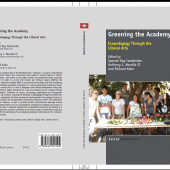
The authors review the book “Greening the Academy: Ecopedagogy through the Liberal Arts”, by Samuel Day Fassbinder, Anthony J. Nocella II and Richard Kahn, from the point of view of Environmental Education, as well as from that of Education for Environmental and Ecological Justice. The review focuses on the importance of the book for tertiary (university level) educational fields. It tries to study the parts of the book within the framework of two major axes transecting all similar – environmental or ecological or justice – educational and research fields: the axis of “old vs. new” and the axis of “local vs. global”.
Continue Reading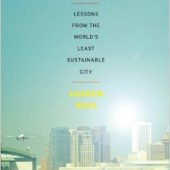
Andrew Ross’s Bird on Fire: Lessons from the World’s Least Sustainable City outlines the past, present, and future of development for the Phoenix area. He succinctly and compellingly argues that it is not only urban sprawl or rising levels of pollution that render this city unsustainable, but political and business agendas, the commitment to growth, and hostility towards immigrants all contribute to the challenges of maintaining Phoenix.
Continue Reading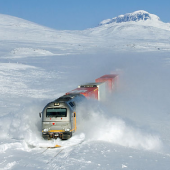
Popular fictional films can support sustainability education by bringing sustainability scenarios to life and appealing to wide audiences. One such film is Snowpiercer, a new film set in the aftermath of an environmental catastrophe. In this review, I cover a variety of themes in the film, discussing how they can be used for sustainability education. The themes include the geoengineering catastrophe that serves as the film’s backdrop and the survivor’s struggles to manage their limited resources. As a warning to the reader, the review also gives away the film’s plot.
Continue Reading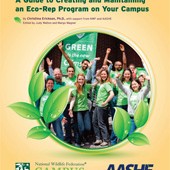
As sustainability peer educator programs continue to develop on college and university campuses, it is important to consider how such programs define and manifest sustainability within their operations. In this article I review a guide, recently published by two international associations, for developing sustainability peer educator programs, and argue that it signals an insufficient approach to sustainability within such programs and that more attention is needed on the economic and social dimensions of sustainability.
Continue Reading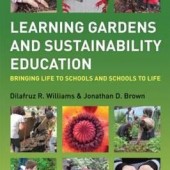
Tricia Francis-Morgan elegantly lays out all the power in Williams and Brown’s book. She gives just enough of a taste of how transformational learning gardens can be, in so many different ways, from the social to the physical, to the biological, that we are left with a desire to quickly get the book. At the same time, Francis-Morgan’s perspective on this pioneering book carries extra weight given her own experiences using learning gardens in the Caribbean.
Continue Reading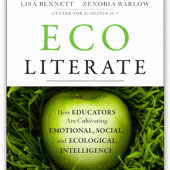
Daniel Goleman, Lisa Bennett, and Zenobia Barlow, in their book Ecoliterate: How Educators are Cultivating Emotional, Social, and Ecological Intelligence, share the stories of a new generation of educators and activists that are displaying the five practices of socially and emotionally engaged ecoliteracy: developing empathy for all forms of life; embracing sustainability as a community practice; making the invisible visible; anticipating unintended consequences; and understanding how nature sustains life. This book provides useful examples and serves as a guide for educators interested in developing a sustainability-focused learning environment for their students through the framework of ecoliteracy. The purpose of the following review is to first present the purpose, argument, and organization of Ecoliterate, and to then evaluate the claims and implications it presents for practitioners of sustainability education.
Continue Reading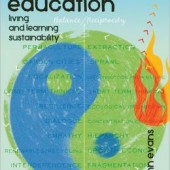
Mark Seis review of Tina Evans book helps us see the power of Evans’ approach to using critical social theory as a vehicle for dissecting out how higher education might really work towards true sustainability. Evans’ book takes on a giant task and delivers a strong call for deeply analyzing the capitalist and materialist forces that dominate higher education so that a truly transformative sustainable education process can be constructed.
Continue Reading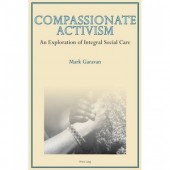
In this informative review, Tina Evans makes the succinct argument that Garavan’s work, which never directly addresses sustainability, nonetheless brings home the central and crucial role of integral social care to a just and sustainable world. Evans’ review provides a great overview of the book and serves as an easy entry-point into this important work.
Continue Reading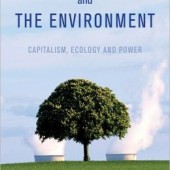
Tina Evans explores the multi-faceted significance of this book about the many different ways we must consider the role of power in the process of globalization. Her review gives us a taste of how broadly Newell defines governance and sees the role of power among state and non-state institutions at many different levels. The relationships among business, governments, trade, finance, capital and the environment all enter into the overview of this important work provided by Evans.
Continue Reading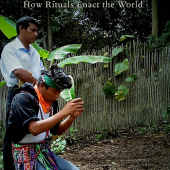
In this deep review of Frederique Apffel-Marglin’s Subversive Spiritualties, Pramod Prajuli takes us to the bio-cultural landscapes in the heart of the high Andes and Amazon of Peru where he so elegantly explains, based on the book, how the true understanding, and regeneration, of this landscape requires acceptance of a profoundly different, non-technical, non-reductionist, and non-“Western” mindset. The esay illustrates residue of enchanted bio-cultural patrimony, as it still survives and thrives in the Peruvian highlands as well as in the High Amazon. The core message of the book is to show that this patrimony is not a one-way street where the humans enact on nature but rather a two-way street where nature also enacts upon members of human species.
Continue Reading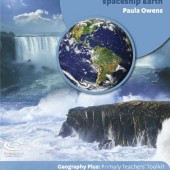
In this succinct and informative review, Shelby Gull Laird provides a good overview and solid recommendation for the comprehensive package of sustainability education K-12 curricular materials about geography—from a local to a global level—available from the UK Geography Association.
Continue Reading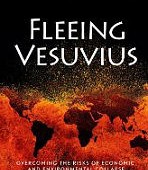
In this concise and useful review, Tina Evans brings forth the high points of Douthwaite and Fallon’s comprehensive book about economic collapse, especially featuring those aspects of the book that might contribute to courses on sustainability and peak oil.
Continue Reading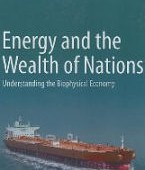
In this insightful review, Tina Evans makes the case for Hall and Klitgaards’ work as going beyond more superficial ecological economic analysis into a deeper realm of biophysical economics where human economies do not just depend on a natural resource base, but are part of it. She is impressed by how thoroughly the book delves into the many theoretical and interdisciplinary aspects of biophysical economics, while engaging the reader and presenting a coherent common theme throughout.
Continue Reading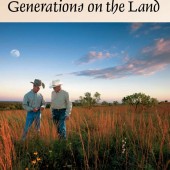
Richard Pritzlaff gives us a good idea what to expect, and not expect, from Nick Patoski’s book. This is not a grand theoretical or comprehensive work on land use or conservation, but, as Pritzlaff explains, stories from real families about their experiences of restoring land, especially grazing land. Pritzlaff gives us enough of a taste to sense the morsels that are here and to let us know how our plate will be filled by reading the whole book.
Continue Reading
Mike Shriberg shows the power of implementing a true discussion-based curriculum in his sustainable campus course at the University of Michigan.
Continue Reading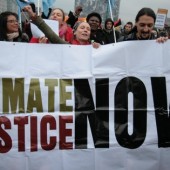
In this insightful review of Brian Tokar’s book, Randall Amster hails the work as a hopeful response to climate change that, rather than playing off of apocalyptic scenarios, envisions a future where society is re-structured not only in technological and economical terms, but also towards a more socially equitable way of life.
Continue Reading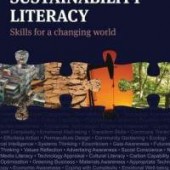
In this detailed and insightful review, Laura Henry-Stone admires the breadth and cohesiveness of this edited volume from mostly European sustainability educators. She makes a good case for bringing this wide array of pieces under one cover, for avoiding static definitions of sustainability, even the traditional “triple bottom line”, and rather looking outside reductionist approaches to find integration, inter-relation and the kind of broad strokes that the chapters in this book propose for educating and solving for sustainability.
Continue Reading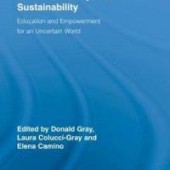
In this insightful review, John Gist gives us some perspective for thinking about science education and its potential for framing the sustainability debate. This is a brief introduction to Gray et al.’s fascinating book Science Society and Sustainability: Education and Empowerment for an Uncertain World. Gist presents the issue of uncertainty in science, in all its complexity, and finds value in the book for addressing deep understanding in a comprehensible and useful way.
Continue Reading
In their review of the Northwest Earth Institute’s A World of Health, the Frolich brothers look to place the wide-ranging issue of environmental health concerns into the every-day framework of so-called “primary health care.” They see value in the book where it addresses what can really be done, through action, and through a guided study group, to confront and change the way our interactions with the environment affect our every-day health.
Continue Reading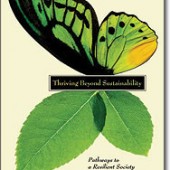
Rick Medrick gives context for Andres Edwards’ new book that takes us beyond sustainability to thriveability. The book suggests that, as the sustainability movement gathers force in the realm of all 3 “E’s” (ecological, economic, social equity), we are at a point of moving towards establishing a newly organized social and ecological environment. Strategies that will allow this to be a thriving environment, according to Edwards, are “SPIRALS:” Scalable, Place-making, Intergenerational, Resilient, Accessible, Life-affirming, and Self-caring.
Rick Medrick nos da un marco de referencia para el libro de Andres Edwards que nos lleva mas allá de la sustentabilidad a la “thriveability.” El libro propone que, mientras el movimiento de sustentabilidad gana fuerzas en el área de los tres “E’s” (ecológico, económico, equidad social), estamos al punto de establecer un ambiente social y ecológico mejor organizado. Las estrategias que nos permita crear este ambiente de superarse, según Edwards son “SPIRALS”: Escalable, Del Lugar, Intergeneracional, Resiliente, Accesible, Afirmando la Vida, y Auto-Cuidando.
Continue Reading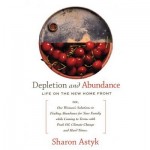
Dennis Lum helps put Sharon Astyk’s book in a historical context and brings forth its pessimistic premise along with its optimistic prescription. While accepting that the crisis is here, and the oil reliance has reached its peak, Astyk sees a special place for the role of women in providing food security while re-inventing a truly productive home environment.
Continue Reading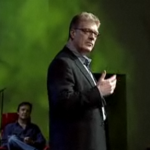
The TED (Technology, Entertainment, Design) website brings videos of world-class TED conference talks to everyone’s finger-tips. Something about the website gets us hooked, and the daily inspiration for ourselves, and our students, keeps us coming back for more.
Continue Reading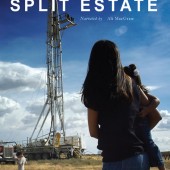
Mark Seis brings the important messages of the film, Split Estates, to our attention in this interesting review. He sees four important warning messages from the film regarding the development of natural gas, what is so commonly viewed as the “cleanest” of fossil fuels.
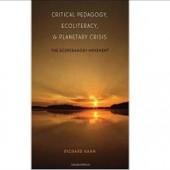
Beth Pollock provides the historical roots and inspiration of Kahn’s Ecopedagogy in Freire and Illich, giving us a good pre-view of what to expect in the book. She finds Kahn’s call for a new kind of pedagogy, founded in these greater thinkers, timely as we work towards establishing educational processes that provide the necessary literacy to face ecological and sustainability issues now and in the future.
Beth Pollock nos indica las raíces históricas y la inspiración por la formulación del “Ecopedagogía” de Richard Kahn, basado en Freire y Illich, dándonos un buen previsto de que los se espera en el libro. Ella encuentra algo pertinente en la llamada de Kahn para una nueva pedagogía, fundada en estos grandes filósofos, mientras trabajamos hacia el establecimiento de un proceso educativo que provee el entendimiento necesario para enfrentar los asuntos ecológicos y de sustentabilidad actualmente y en el porvenir.